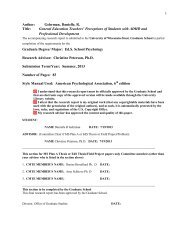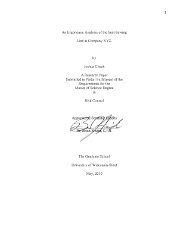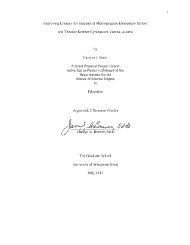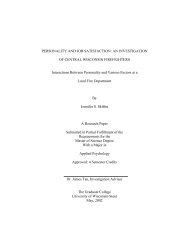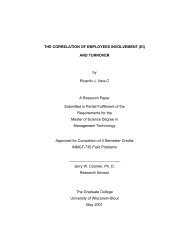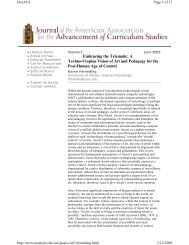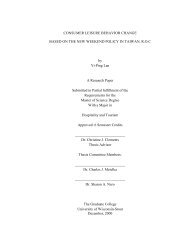A Review of the Literature on Three Types of Disenfranchised Grief ...
A Review of the Literature on Three Types of Disenfranchised Grief ...
A Review of the Literature on Three Types of Disenfranchised Grief ...
You also want an ePaper? Increase the reach of your titles
YUMPU automatically turns print PDFs into web optimized ePapers that Google loves.
that a grief reacti<strong>on</strong> was less likely, expressi<strong>on</strong>s <str<strong>on</strong>g>of</str<strong>on</strong>g> sympathy toward <str<strong>on</strong>g>the</str<strong>on</strong>g> griever were less<br />
appropriate, and that <str<strong>on</strong>g>the</str<strong>on</strong>g>re would be less social support available to <str<strong>on</strong>g>the</str<strong>on</strong>g> griever. Ano<str<strong>on</strong>g>the</str<strong>on</strong>g>r study<br />
c<strong>on</strong>ducted by Cohen (1997) focused <strong>on</strong> college students' grief resp<strong>on</strong>ses to various types <str<strong>on</strong>g>of</str<strong>on</strong>g><br />
death and n<strong>on</strong>-death losses. He found that participants were less likely to seek out help and<br />
social support when <str<strong>on</strong>g>the</str<strong>on</strong>g>y perceived a lack <str<strong>on</strong>g>of</str<strong>on</strong>g> recogniti<strong>on</strong> <str<strong>on</strong>g>of</str<strong>on</strong>g> <str<strong>on</strong>g>the</str<strong>on</strong>g>ir grief by o<str<strong>on</strong>g>the</str<strong>on</strong>g>rs (i.e.<br />
disenfranchised losses). Based <strong>on</strong> <str<strong>on</strong>g>the</str<strong>on</strong>g> available literature, Thornt<strong>on</strong> & Zanich (2002) c<strong>on</strong>cluded<br />
that people do in fact perceive losses differently depending <strong>on</strong> <str<strong>on</strong>g>the</str<strong>on</strong>g> type <str<strong>on</strong>g>of</str<strong>on</strong>g> loss, <str<strong>on</strong>g>the</str<strong>on</strong>g> type <str<strong>on</strong>g>of</str<strong>on</strong>g><br />
relati<strong>on</strong>ship, and <str<strong>on</strong>g>the</str<strong>on</strong>g> type <str<strong>on</strong>g>of</str<strong>on</strong>g> griever. As Cohen's study (1997) suggests, <str<strong>on</strong>g>the</str<strong>on</strong>g>se "grieving rules"<br />
are so widely held that <str<strong>on</strong>g>the</str<strong>on</strong>g>y are even accepted by grievers <str<strong>on</strong>g>the</str<strong>on</strong>g>mselves. The rules not <strong>on</strong>ly deter<br />
caregivers from providing social support, but <str<strong>on</strong>g>the</str<strong>on</strong>g>y also discourage grievers from seeking out<br />
social support. When grievers lack support and validati<strong>on</strong>, <str<strong>on</strong>g>the</str<strong>on</strong>g>ir grief is likely to become<br />
complicated.<br />
Purpose <str<strong>on</strong>g>of</str<strong>on</strong>g> <str<strong>on</strong>g>the</str<strong>on</strong>g> Study<br />
The purpose <str<strong>on</strong>g>of</str<strong>on</strong>g> this paper is to explore <str<strong>on</strong>g>the</str<strong>on</strong>g> c<strong>on</strong>cept <str<strong>on</strong>g>of</str<strong>on</strong>g> disenfranchised grief by reviewing<br />
available literature <strong>on</strong> three types: grandparent grief, grief <str<strong>on</strong>g>of</str<strong>on</strong>g> birthmo<str<strong>on</strong>g>the</str<strong>on</strong>g>rs following adopti<strong>on</strong>,<br />
and <str<strong>on</strong>g>the</str<strong>on</strong>g> grief <str<strong>on</strong>g>of</str<strong>on</strong>g> ex -spouses.<br />
Grandparent grief. When a child dies, much <str<strong>on</strong>g>of</str<strong>on</strong>g> <str<strong>on</strong>g>the</str<strong>on</strong>g> attenti<strong>on</strong> is focused <strong>on</strong> <str<strong>on</strong>g>the</str<strong>on</strong>g><br />
immediate family while <str<strong>on</strong>g>the</str<strong>on</strong>g> grief <str<strong>on</strong>g>of</str<strong>on</strong>g> <str<strong>on</strong>g>the</str<strong>on</strong>g> child's grandparents tends to be disenfranchised<br />
(P<strong>on</strong>zerti & Johns<strong>on</strong>, 1991). Research indicates that grandparents typically do experience<br />
complex and intense grief reacti<strong>on</strong>s; <str<strong>on</strong>g>the</str<strong>on</strong>g>y not <strong>on</strong>ly grieve <str<strong>on</strong>g>the</str<strong>on</strong>g> loss <str<strong>on</strong>g>of</str<strong>on</strong>g> <str<strong>on</strong>g>the</str<strong>on</strong>g>ir grandchild, but also<br />
grieve over <str<strong>on</strong>g>the</str<strong>on</strong>g> pain experienced by <str<strong>on</strong>g>the</str<strong>on</strong>g>ir bereaved adult child, <str<strong>on</strong>g>the</str<strong>on</strong>g> deceased child's parent (Fry,<br />
1997; Nehari, Grebler, & Toren, 2007; P<strong>on</strong>zerti, 1992; P<strong>on</strong>zetti & Johns<strong>on</strong>, 1991). This<br />
11



